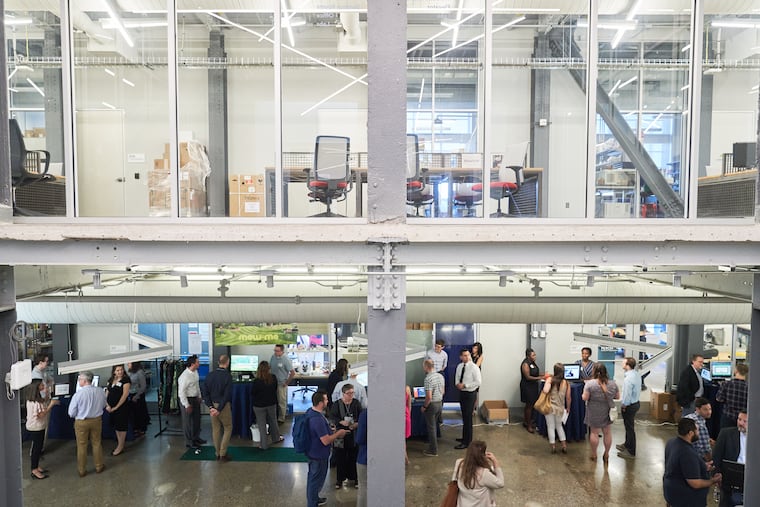Penn’s Boot Camp turns a gravedigger into a coder in 24 weeks
Forty-five students graduated this week from the Penn LPS Coding Boot Camp, aiming to break into Philly's tech market. A large demand exists for coding skills, especially involving the languages of Java and JavaScript.

Michael McVeigh, 27, of Abington, used to moonlight as a gravedigger at West Laurel Hill Cemetery. But last year, he decided to plot a career change, and enrolled in the Penn LPS Coding Boot Camp. Now he's working as a software developer at 21PSTEM, an educational software firm in Conshohocken.
The Penn LPS Coding Boot Camp, co-sponsored by the University of Pennsylvania College of Liberal and Professional Studies and Trilogy Education Services, a for-profit workforce accelerator, aims to facilitate career changes for students looking to break into Philly's tech market. The program held a "Demo Day" on Thursday to celebrate the end of the boot camp's first session, which ran from Jan. 22 through Saturday, and showcased the students' coding projects at the Pennovation Center, a Penn building that houses coworking facilities and startups.
The event resembled a cross between a networking event and a science fair.
Projects ranged from Curlboodle, which scans hair product barcodes and cross-references them with a database of properties to find the best formula for natural hair, to Intervw.Me, a "cross between Glassdoor and Twitter" that provides sample questions for logic-based job interviews like those famously offered by Google and Facebook. One sample question — "where does the child seat go in a Porsche?"
Trilogy Education Services, started in 2015 by CEO Dan Sommer, works with 37 universities to provide similar bootcamp-style programs, including Penn and Rutgers University. The Penn program will graduate 45 students, and meets three times a week for about six months. Tuition is $11,950. A comparable 24-week program offered by Trilogy's competitor Fullstack Academy costs $15,680, according to its web site.
A 2017 survey of 1,450 boot-camp graduates by Course Report found that the median post-boot-camp salary was $65,000. Most took one to six months to find a job. And those who taught themselves beforehand reported higher salaries. Still, the survey was voluntary and likely skewed positive.
Sommer says the teachers must have "at least five to seven years of work experience," and go through a screening process administered by Trilogy, but Penn has final say over hiring.
Rita McGlone, executive director of professional and organizational development at Penn's LPS, calls the program "rigorous but achievable." The 45 students are "about 22 percent with only high school diploma or GED," 30 percent women, and 12 percent African American.
Some participants, Sommer says, are looking to "upskill," while others are seeking to make a change in industry. The median age is 26 across Trilogy's programs.
The Economy League of Greater Philadelphia's report on information technology jobs in Philly attributes 25 percent of net job growth in the area to new IT jobs from 2002 to 2017, and says that IT employers here "are struggling to fill high-skills jobs openings." This employment gap for tech skills is fueling more coding bootcamps like Trilogy's. "Still, most of these programs are relatively small; combined, they do not reach sufficient scale to fully address the supply/demand gap in our region," the league's report said; Employers ultimately need to partner with K-12 schools to get enough workers.
Shahrukh Tarapore, head of engineering at Arcweb Technologies, a software firm in Old City, says coding programs are helpful but not sufficient by themselves. "If I see a resumé with coding boot camp on it, I would also look for past projects," he said. "Knowing a design pattern or language syntax is very different from knowing about testing rigor or system performance or code elegance and maintainability."
He adds: "The compressed time frame may not allow for consideration of the larger implications of software decisions."
Nora Granahan, 30, of Delaware County, previously worked in fundraising for the Pennsylvania Academy of the Fine Arts. Her background inspired her project, "Free Public Art in Philadelphia," which culls a mapable database of public art from OpenData Philly onto a website for users to create collections of their favorite works. It hasn't been rolled out publicly yet.
Granahan chose to attend the boot camp rather than apply to graduate school, and the compressed time frame of the bootcamp was a big draw. In the program's 15th week, she was hired as a junior web developer at P'unk Avenue LLC, a design firm that works with socially conscious companies.